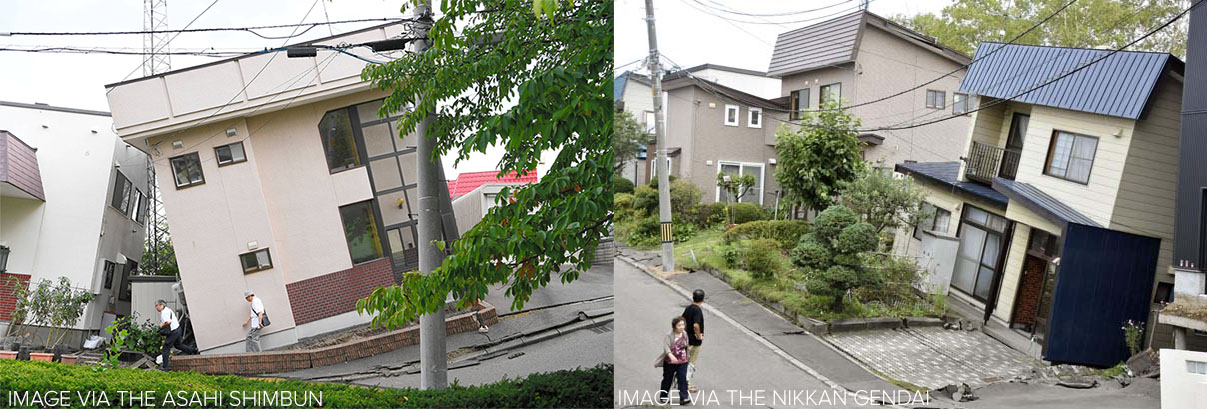MLIT to forcibly finish land hazard surveys across country
The Ministry of Land, Infrastructure, Transport and Tourism (MLIT) plans to publish embankment and liquefaction risk maps online later this year in an effort to provide more transparency for home owners and buyers.
80% of sellers/buyers not choosing home inspections
According to a survey carried out by the Ministry of Land, Infrastructure, Transport and Tourism (MLIT) in the first half of 2018, only 18% of transactions involved home inspections.
Between April and September 2018, a total of 5,932 home inspections were carried out across Japan. A total of 12,904 inspections were forecast for the year, almost double the number seen in 2017. Still, this amounts to less than 8% of the 169,000 existing home sales on an annual basis.
Liquefaction in Sapporo caused by poor soil conditions

The September 2018 Hokkaido Iburi Earthquake resulted in severe liquefaction in part of Sapporo’s Kiyota Ward, leaving roads caved in and homes leaning at dangerous angles. As of October 3, as many as 1,452 homes had suffered damage in Kiyota Ward. This wasn’t the first instance for the neighborhood with liquefaction observed during the 2003 Hokkaido Earthquake which had an epicenter 300 kilometers away. The liquefaction hazard map issued by the city had previously designated this area as being of high risk for liquefaction damage.
Behind the real estate investment scams that have Japan’s regional banks concerned
The following is a summary of the recent information that has come out since the share house and whole-building investment scam scandal has been exposed in Japan.
Inflated rental projections
Guaranteed or estimated market rents were set much higher than actual market rents in order to inflate yields and sale prices. Share houses were perfect for this since it can be difficult to gauge appropriate market rent, making it easy to inflate figures. Share houses operated by one defunct operator were running at occupancy ratios of just 20%.Read more
Whole building investment scam widens
The scandal surrounding dubious lending practices and falsified loan documents on investment properties widened last week with the Asahi Shimbun newspaper obtaining over 1,000 records of correspondence that allegedly implicates real estate agents and several Suruga Bank employees. The correspondence, which took place via email and LINE messages, is alleged to show the bank staff receiving numerous falsified documents including faked rent rolls for investment buildings.Read more
Second share house company files for bankruptcy
In the wake of a widening investment loan fraud scandal, a second share house company in Tokyo has filed for bankruptcy.
The company operated by developing and selling share houses to individual investors and then managing the properties on behalf of the buyers, offering high yields and guaranteed rents. However, as was the case with the other defunct share house operator that filed for bankruptcy last month, the vacancy rates of the share houses was higher than forecast and the company was not able to make the guaranteed rent payments to investors.Read more
Falsified documents submitted to 11 Bank Branches
A report by the Asahi Shimbun newspaper on May 5, has alleged that that mortgage fraud scandal now extends to 11 Suruga Bank branches across Japan. The newspaper alleges that five companies are involved in obtaining loans from various Suruga branches that were based on falsified income statements, resulting in over-loans to borrowers. The Suruga branches that have discovered faked documents include Tokyo, Shibuya, Shinjuku, Midtown, Futako-Tamagawa, Kawasaki, Omiya, Tama Plaza, Sendai and Kyoto.
On May 7 the newspaper dropped another bombshell, reporting that the lawyers representing a group of investors had received an audio recording of a phone call that took place in April 2016 between a real estate agent and an alleged bank employee. In the recording, which was released to the public, the broker asked the bank staffer for advice on what to do if a sales agency was unable to tamper with the loan application documents. The bank staffer mentioned a company that takes on a lot of those requests. The broker then called the company in question and they confirmed that they could falsify documents. Suruga's share price briefly dropped by as much as 11% the following morning before recovering.
